Chaitra Vedullapalli
When it comes to maintaining the health of your technology startup and/or services business, especially in times of uncertainty, there is no lifeline more powerful than qualified leads. To fill that pipeline, buyers need to feel certain that your solution, application, or product is the best, most trustworthy choice, and this is where things tend to fall apart. How can a startup establish the level of trust needed for a new audience to commit when they’re just starting?
This is where Meylah’s “Better Together” co-sell GTM strategy comes into play.
With a staggering 17% of the $13 trillion B2B (business-to-business) spending dedicated to it, “co-sell” dominated cloud marketplaces in 2023. With this seismic shift, the doors have swung wide open to reveal new customer segments and untapped revenue streams, setting the stage for an enticing business opportunity. Before going into the details of the “Better Together” GTM co-sell strategy, I want to lay the groundwork for what “co-selling” means.
Co-selling is a collaborative GTM partnership between SaaS (software as a service) companies and large cloud hyperscalers such as Amazon Web Services (AWS), Microsoft Azure, Google Cloud Platform (GCP), and others. This partnership involves a joint effort to build, market and sell joint technology solutions and services to customers. At its core, co-selling is joining forces with cloud hyperscalers to jointly develop solutions, attract customers, and leverage the partner’s sales and/or customer success team to drive value for existing customers.
Since July 2023, co-selling with cloud marketplaces has become the new gold standard, as they are intricately intertwined and essential for forging prosperous partnerships with cloud services that ultimately enrich your business, your buyers, and your partners.
In the cloud co-sell model, the transformation happens at three levels simultaneously. The growth on the first level is product-led, which means the product is built on a hyperscaler’s cloud infrastructure. On the second level, the joint solution is usage-based monthly recurring revenue (MRR), which looks like billed revenue or cloud consumption revenue. Lastly, on the third level, the growth happens when the solution-based offer becomes available on cloud marketplaces to help customers transact and onboard to a trust-based buying engine in order to meet their cloud demand and budget constraints.
The basis of the co-sell GTM strategy is built on intimately understanding the problem and debunking the most common myths of the partner experience. The problems that most partners are currently experiencing are poor alignment, hitting annual recurring revenue (ARR) goals, driving GTM efficiency, opening new routes to market, improving sales productivity and lack of understanding complex investment planning and return on investment (ROI), which results in poor measurements and ineffective tracking.
Meylah played a critical role in supporting Microsoft’s launch of the #buildfor2030 initiative, honing in on what startups need to become “co-sell ready” with cloud marketplaces.
When crafting your co-sell GTM strategy, adhere to these five guiding principles:
- Alignment is key: Successful partnerships require alignment not just in goals, but also in mindset and philosophies. When both parties share a common vision and approach to business, the partnership is more likely to flourish.
- Expect 5x ROI: To justify investments and partnerships, it’s crucial to set high expectations for ROI. A 5x ROI minimum ensures that resources are allocated efficiently and that the partnership brings tangible benefits.
- Streamline your GTM plan: Funding should come from multiple sources, which means a streamlined and focused GTM plan ensures that efforts are concentrated on key objectives. Additionally, funding from multiple sources diversifies support and minimizes dependency on a single entity.
- Transactable via marketplaces: In an increasingly digital world, the ability to transact through online marketplaces is essential. Making your joint customer offer accessible in this manner enhances convenience and scalability.
- Invest strategically: This can be the catalyst for capturing the attention of hyperscalers. These investments not only demonstrate commitment, but also showcase your company’s potential for growth and innovation.
After you’ve identified your co-sell partner, there are four essential documents that every prospective partner must have in place when engaging with hyperscalers: the co-sell GTM assessment, the #BetterTogether company information evaluation, the co-sell solution-offer information breakdown, and the GTM plays and investment model. The following sections cover what each document is and why it is essential.
Co-sell GTM assessment
The co-sell GTM assessment is the cornerstone of building a thriving co-sell partnership with cloud hyperscalers. The GTM assessment provides a comprehensive evaluation by encompassing six core areas and 31 fundamental activities that are essential for fostering a successful partnership.
This free assessment is more than just a questionnaire; it’s a dynamic process that culminates in a five-page report and a roadmap for your company’s strategic direction. The assessment process isn’t a solitary endeavor. It’s strongly recommended that two to three key individuals within your company participate.
This collaborative approach helps establish a common vision and understanding of your company’s goals and aspirations in the context of co-selling with hyperscalers. It ensures that everyone is on the same page, aligning their perspectives and expectations. The assessment isn’t just about assessing your current state; it’s about charting a path forward. The roadmap that emerges from the assessment process identifies the “big bets” your company should consider taking. These are strategic moves and investments that have the potential to propel your co-sell partnership with hyperscalers to new heights.
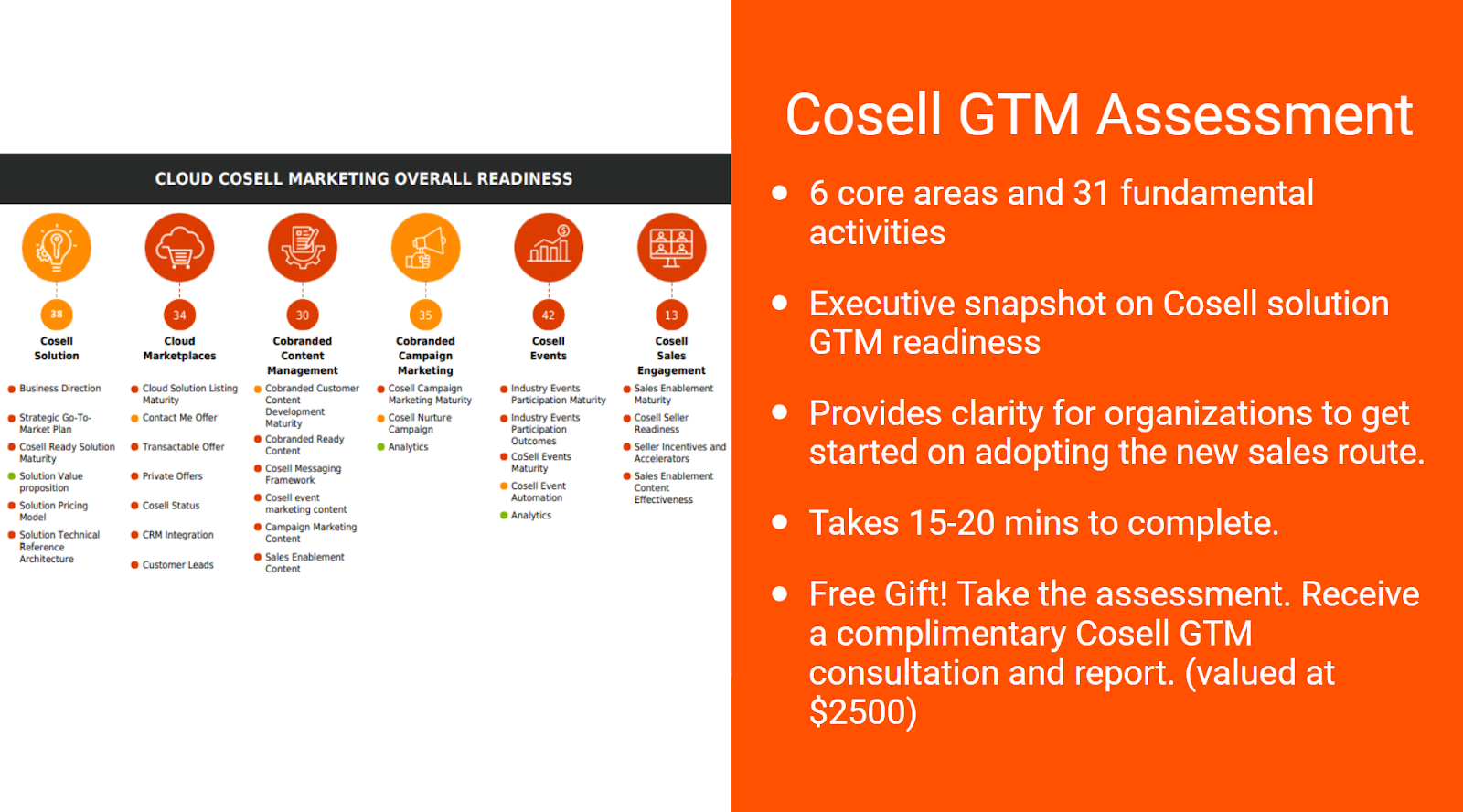
#BetterTogether company information evaluation
The #BetterTogether company information evaluation is your opportunity to present your company’s credentials in a concise and impactful way. It offers an at-a-glance view for the hyperscaler to understand your company’s background, mission, values, and unique selling points. This is where first impressions are made, so it’s crucial to make this count. Here is an example of a completed #BetterTogether company information evaluation document for reference:
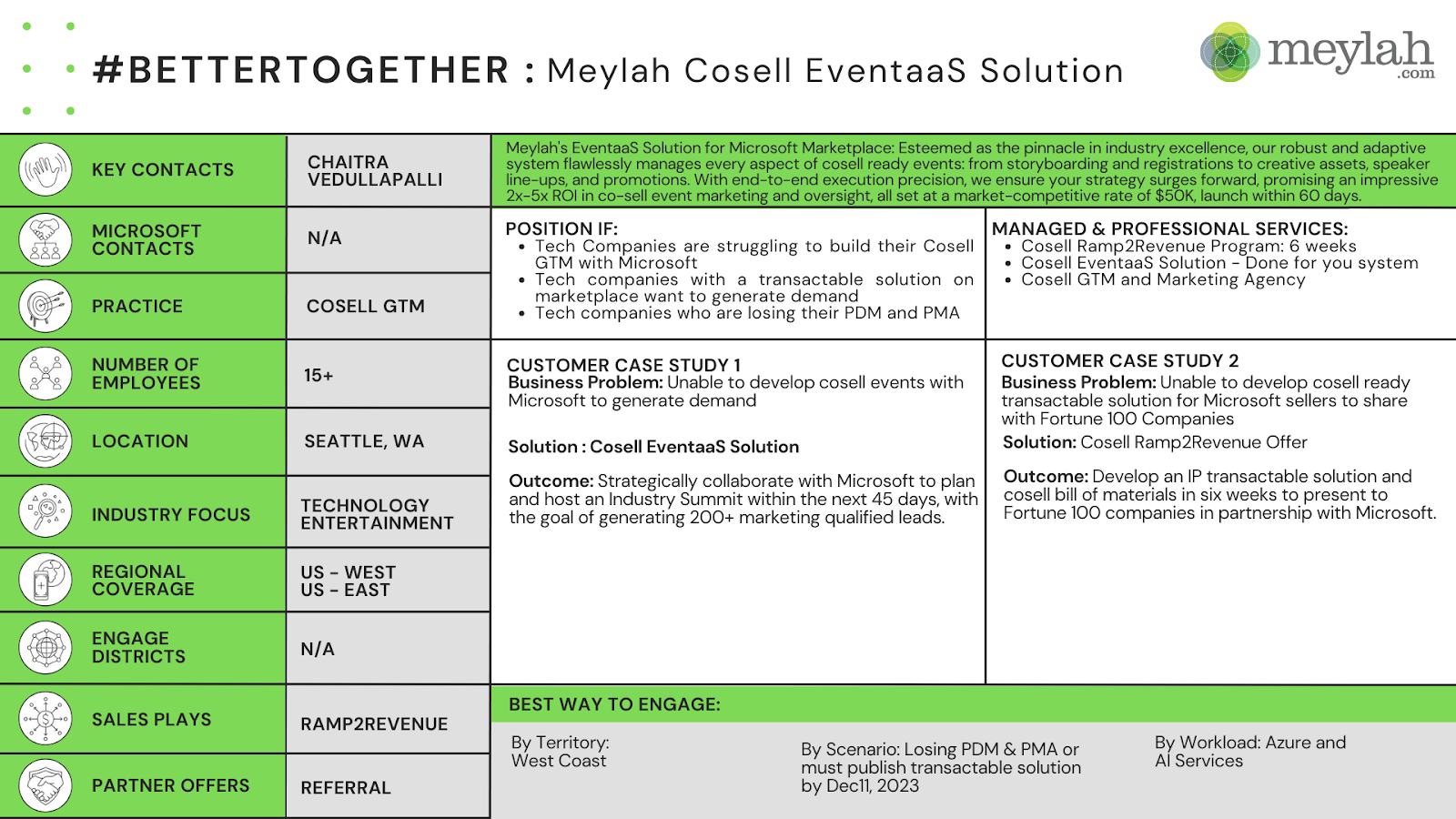
Once your company information evaluation is completed, this is how it will translate into a transactable listing on the Microsoft cloud marketplace:
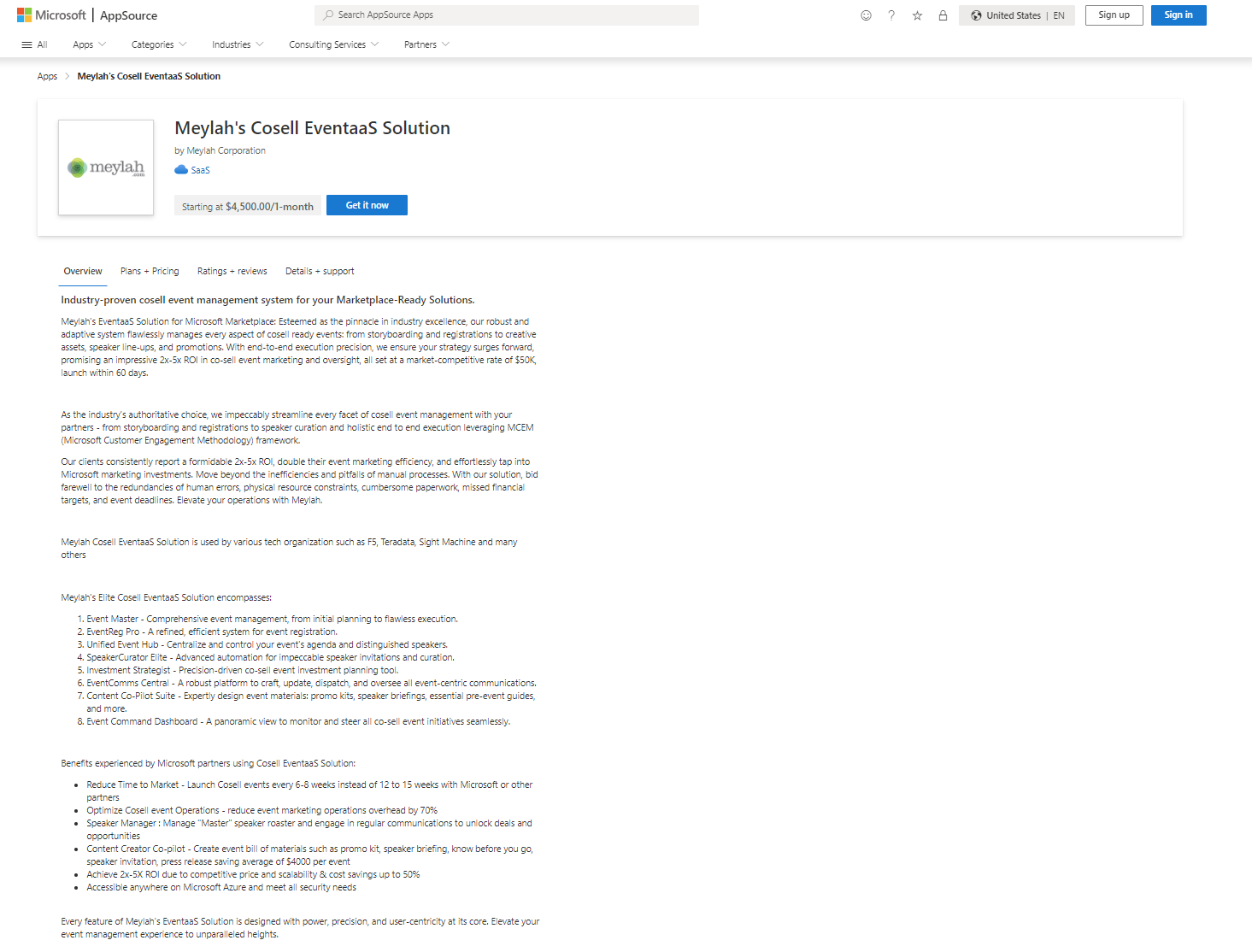
The co-sell solution-offer information breakdown
The co-sell solution-offer information breakdown is where the substance lies. To effectively capture the attention of hyperscalers and ensure the success of your partnership, it’s crucial to provide clear and comprehensive information about your solution offer. The solution offer must clearly articulate joint value proposition and benefits, define a qualified audience in a specific industry, determine pricing, and detail the hyperscaler’s product integration.
To set yourself apart when building your solution offer, focus on including the following requirements:
- Differentiation: This is your offer’s ability to address a specific industry challenge.
- SaaS ready: Your solution offer can be built on the hyperscaler’s cloud services stack and functions as a SaaS solution.
- Transactability: Your offer is listed as a transactable solution in the hyperscaler’s marketplace.
- Repeatability: Being able to implement and sell your solution offer in a repeatable manner.
- Co-sell GTM: Ensure that your solution offer possesses critical co-sell GTM assets and an execution plan to drive demand generation and sales plays.
Invest the time it will take to ensure that your co-sell solution offer aligns with these requirements to maximize your partnership’s potential. Refer to the completed Solution Offer Information document below for reference.
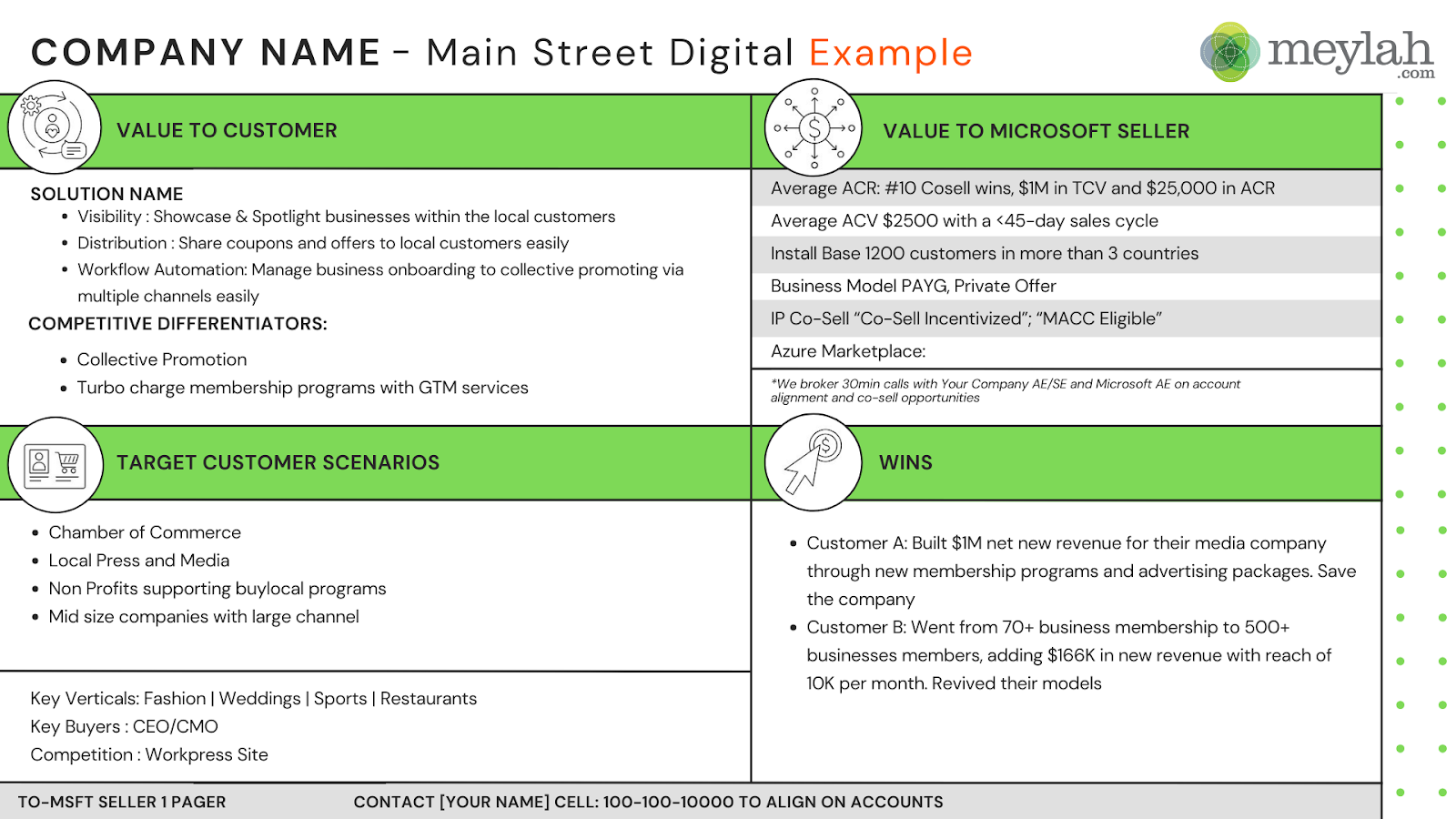
The GTM plays and investment model
The GTM plays and investment model is the final and integral piece. Hyperscalers want to know that you not only have a well-thought-out go-to-market strategy, but also the capability to execute it. The GTM plays and investment model gives you the space to outline your marketing and sales plays by quarter and the investment required to execute it. There are four cutting-edge GTM strategies that are dominating right now and help businesses gain access to GTM investments from hyperscalers: research-based strategy, event-based strategy, community-based strategy, and partnership-based strategy.
Research-based strategy
This strategy is rooted in comprehensive market analysis, customer insights, and competitor intelligence. According to a report by Forrester, businesses that prioritize market research are 2.2x times more likely to achieve revenue growth than their counterparts. The average cost of developing the questionnaire, running the marketing campaign, organizing the data, developing reports, and publishing the reports can cost anywhere from $50,000 to $300,000.
Event-based strategy
This strategy involves partnering with other businesses to co-host events, generate leads, and create valuable content. B2B businesses that leverage event marketing report a 20% conversion rate, highlighting its potential for lead generation.
The average cost to develop a co-sell GTM event that is driven by content and joint offers ranges anywhere from $7,000 to $30,000. A major factor in this is whether the event is held online or in person. To make a co-sell event successful, it’s essential to establish a system that is predictable and adaptable.
Community-based strategy
This is by far the most accessible opportunity for every company focused on brand building and demand generation. This strategy involves direct interaction with your customers by gathering feedback and nurturing a sense of belonging. The average cost of developing a community-led GTM is driven by programs, scholarships, and events. Pricing for these initiatives typically starts around $10,000.
Partnership-based strategy
While this is accepted as the most impactful B2B GTM strategy, it is also typically the most expensive. This strategy rests on establishing a co-sell event-based system. This is the fastest way to gain immediate attention from hyperscalers, as it helps with both brand building and generating qualified marketing leads. It’s not just about what you offer, but also how you plan to bring it to market effectively. Statistics reveal that B2B companies engaging in partnerships experience a 35% increase in customer retention. The average cost of developing a joint and integrated campaign, whether it is content driven, offer driven, or sales driven, ranges anywhere from $100,000 to $250,000.
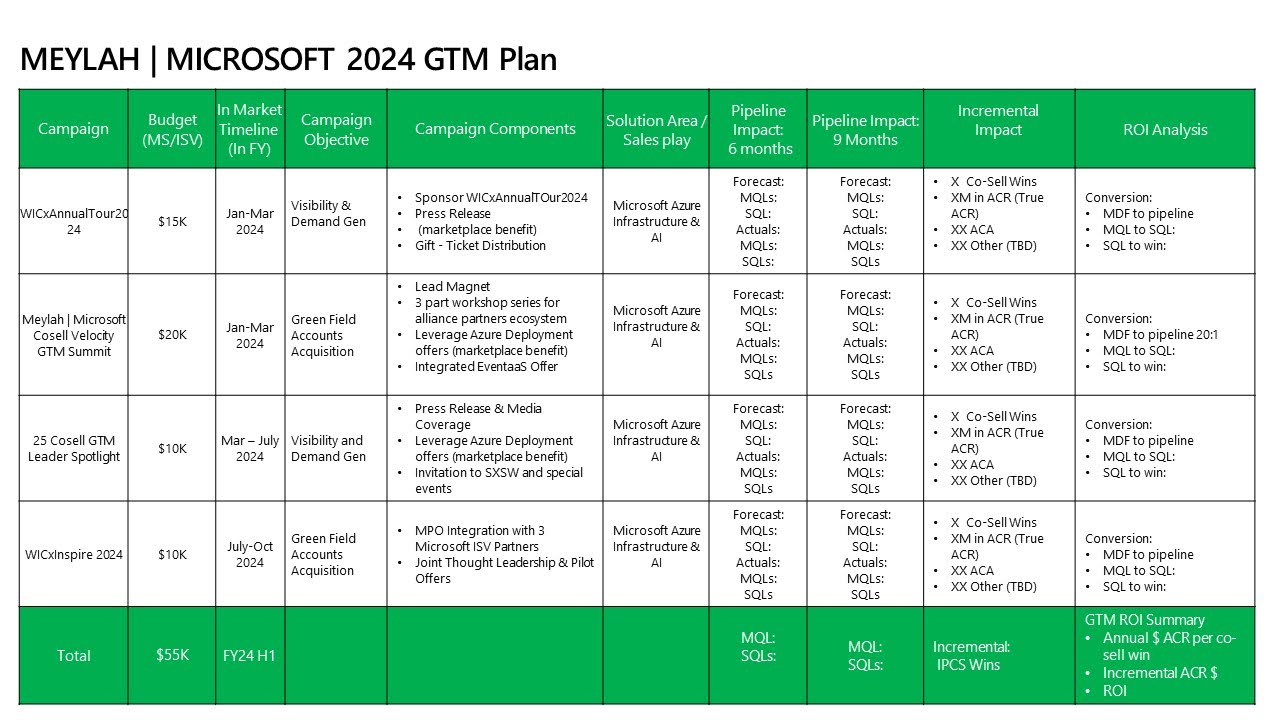
Next steps
Co-sell relationships are multifaceted and require a lot of upfront work. From building a joint solution offer, to marketing, and eventually to selling together. After you finish these four documents, the next step is to publish your transactable offer and execute your first quarterly GTM plays in the market for visibility and demand generation.
If you’re looking to create a solid GTM co-sell plan, investing in the full spectrum of GTM plays, both in marketing and sales, is the key to unlocking your true potential for co-selling with cloud hyperscalers. While there are more activities in your co-sell journey, these guiding key principles and essential documents will give you an excellent base to approach hyperscalers with confidence.





























Comment